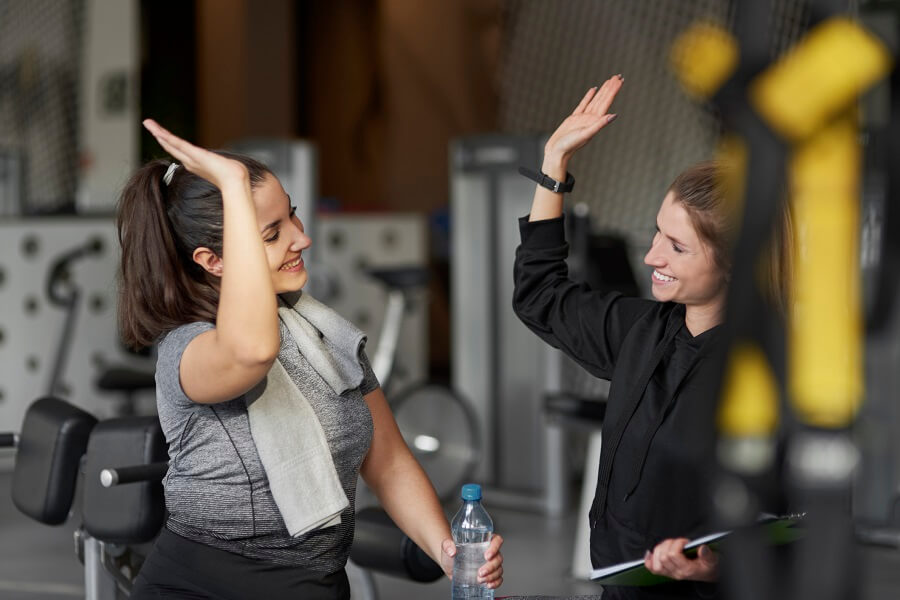How to Make Rest and Recovery a Priority in Your Fitness Routine
How to Make Rest and Recovery a Priority in Your Fitness Routine
Posted on: May 8, 2025 in RoutinesIn our busy world, forgetting the role of sleep in fitness recovery is easy. Everything may be go, go, go, but we need to make time for rest to properly support our fitness journey.
While the National Sleep Foundation (NSF) suggests adults get seven to nine hours of sleep nightly to gain the full benefits of fitness recovery, most of us get far less. Improving your sleep hygiene and prioritizing rest as a core part of your schedule is essential for physical health and performance.
Why Is Sleep So Important for Fitness Recovery?
While it might not seem like anything is happening while you’re asleep, your brain and body are working hard to replenish your energy levels, restore damaged tissues and eliminate waste. The most important recovery benefits of sleep include:
- Muscle repair: Anabolic hormones, such as growth hormone, use glycogen from your diet to rebuild the microscopic tears in your muscles that you create during your workouts.
- Waste removal: During rapid eye movement (REM) sleep, your brain clears away metabolic waste that can damage brain function.
- Increased energy: Proper sleep gives you the energy you need to stay active throughout the day and power through tough workouts.
- Improved mental health: Getting enough sleep is essential for keeping your mind healthy, which can make staying motivated and sticking to your fitness routine easier.
What Happens When You Don’t Sleep?
While we all know the feeling of heavy eyes after a sleepless night, poor sleep can cause more significant issues, especially over a long period of time:
- Muscle breakdown: Catabolic hormones like cortisol break down your tissues when you don’t get enough sleep to produce additional energy, making it difficult for your muscles to recover from tough workouts.
- Brain fog: Exhaustion and sleepiness can make staying fully alert throughout the day challenging, causing forgetfulness, stress and lack of focus.
- Appetite changes: You might feel hungrier than usual after a long night due to an imbalance in the hunger hormones leptin and ghrelin. This increased appetite can easily lead to overeating and make losing weight or maintaining healthy body composition harder.
Sleep Hygiene Tips for Improved Sleep Duration and Recovery
There’s a strong connection between long, uninterrupted sleep cycles and muscle repair. Practicing better sleep hygiene can help you promote healthier, more restful sleep so you can feel and do your best.
1. Manage Your Light Exposure
Lighting has a huge impact on how well you sleep. Your circadian rhythm, the internal clock that regulates waking and sleeping, relies on changing light to trigger the production of the sleep hormone melatonin. Interrupting melatonin production can easily disrupt your sleep cycles, making it harder to get the rest you need.
Getting bright sunlight in your eyes can help you feel more energized and keep you awake. Try drinking your morning coffee on the porch on bright days or taking a midday walk to absorb some sunlight. Light therapy lamps can be a good substitute during the winter or on days when the sun isn’t out.
In the evenings, though, you’ll want to create a darker atmosphere. Too much exposure to bright lights — especially screens that emit blue light — can disrupt melatonin production and keep you up. Experts recommend shutting off screens and dimming the lights at least one hour before bed to support natural melatonin release and let your brain relax.
2. Exercise Regularly
Whether you lift weights as a hobby or you’re training for a race, sticking to a regular exercise routine can promote better sleep by supporting a stable circadian rhythm. While the Centers for Disease Control and Prevention (CDC) states adults should get at least 150 minutes of moderate to vigorous exercise each week, many Americans don’t move enough to make a difference.
Studies have shown that people who exercise early in the morning sleep longer and more deeply than those who exercise later in the day. If you can only work out in the evening, though, you’ll still get sleep benefits. Just try to finish your session at least one or two hours before you hit the hay to ensure the energizing hormones known as endorphins are out of your system.
That said, it’s sometimes tough to make sure you’re getting enough movement in when you have so much else going on. Even squeezing in 10-minute bursts of activity into your daily schedule can go a long way in improving your sleep quality.
3. Create a Relaxation Routine
Some people find it easier to fall asleep if they focus on relaxing their minds and bodies before bed. Following a consistent bedtime routine signals to your body that it’s time to sleep. Relaxation practices you might try adopting include:
- Yoga: This ancient practice combines breathing exercises with static poses to release tension while building strength and flexibility. Attending yoga or guided stretching classes on a regular basis can teach you how to incorporate the practice into your bedtime routine for greater peace of mind and physical health. Plus, you can do yoga anywhere — even from your bed!
- Meditation: While meditation can be challenging at first, building this skill can help you trigger your body’s relaxation response and relieve stress. Some types of yoga combine deep meditation with physical flows to help people find peace spiritually as well as mentally.
- Breath work: Deep breathing exercises help to calm the nervous system and lower your heart rate, which is essential for relaxing your body for sleep.
Sleep Disorders: When Should You See a Professional?
People with sleep disorders often have difficulty getting enough rest to refresh their bodies, even if they have excellent sleep hygiene habits. Medical professionals, such as sleep specialists, can help diagnose and treat these conditions.
You may wish to consult with a professional if you frequently have trouble falling asleep within 30 minutes or if your legs feel tingly or twitchy when you try to go to sleep. Other signs include waking up:
- Gasping for air or after especially loud snoring.
- In the middle of the night and struggle to fall back asleep.
- Prematurely, even without an alarm.
It’s often best to start by talking to your primary care provider (PCP) because they can refer you to the appropriate specialists. For example, if you struggle to fall asleep due to overthinking, your provider might refer you to a psychologist or psychiatrist who can help you improve your mental habits.
Improve Your Sleep Hygiene With Help From 5 Bridges Health & Fitness
Physical exercise and sleep go hand in hand. Joining a gym that takes a comprehensive approach can help you get started on improving your sleep habits. You might be an experienced gym-goer, or you might be hitting the floor for the first time. Either way, we’d be happy to welcome you to our club!
From calming yoga classes to personal training plans and one-on-one nutrition counseling, our team provides a wide range of services to help you achieve your fitness goals.
Submit our online form to get your free pass, or take our virtual tour to see what we’re all about.



